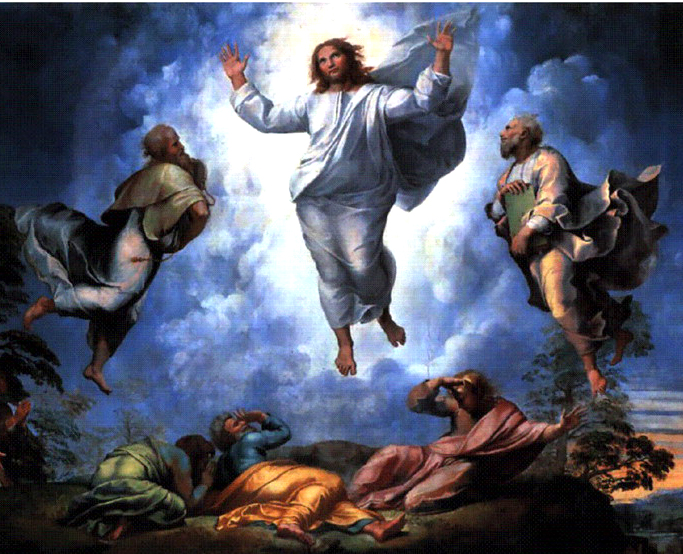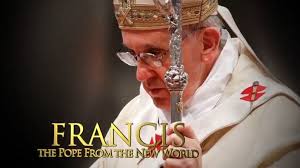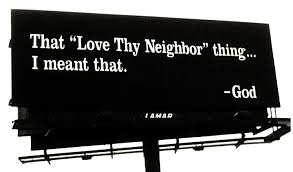
25-2-2024 –
Gospel reading: Mark 9:2-10
 vs.2 Jesus took with him Peter and James and John and led them up a high mountain where they could be alone by themselves. There in their presence he was transfigured:
vs.2 Jesus took with him Peter and James and John and led them up a high mountain where they could be alone by themselves. There in their presence he was transfigured:
vs.3 his clothes became dazzling white, whiter than any earthly bleacher could make them.
vs.4 Elijah appeared to them with Moses; and they were talking with Jesus.
vs.5 Then Peter spoke to Jesus. “Rabbi,” he said “it is wonderful for us to be here; so let us make three tents, one for you, one for Moses and one for Elijah.”
vs.6 He did not know what to say; they were so frightened.
vs.7 And a cloud came, covering them in shadow; and there came a voice from the cloud,
“This is my Son, the Beloved. Listen to him.”
vs.8 Then suddenly, when they looked round, they saw no one with them any more but only Jesus.
vs.9 As they came down the mountain he warned them to tell no one what they had seen, until after the Son of Man had risen from the dead.
vs.10 They observed the warning faithfully, though among themselves they discussed what “rising from the dead” could mean.
*******************************************************************
We have four commentators available from whom you may wish to choose . Scroll down to the name of the commentator.
Michel DeVerteuil : A Holy Ghost Father, late director of the Centre of Biblical renewal . Trinidad, W.I.
Thomas O’Loughlin: Professor of Hist Theology Uni of Nottingham NG7 2RD
Sean Goan: Studied scripture in Rome, Jerusalem and Chicago and works with Le Chéile Schoools
Donal Neary SJ: Editor of The Sacred Heart Messenger and National Director of The Apostlship of Prayer.
****************************************
Michel DeVerteuil
Lectio Divina with the Sunday Gospels
www.columba.ie
General Comments
We often refer to this story as the Transfiguration. In fact however, Jesus’ appearing in glory was merely a new stage in the journey the apostles made with him. From his first manifestation in the world, Jesus was clearly visible as Saviour of all those in need of help. He appeared so especially to those who felt they were in some sort of need and so wanted to turn to him in their prayer for healing and forgiveness.
The gospels often tell us about this element of Jesus’ journey. People were attracted to him for this reason alone, which is also why Jesus withdrew from the crowd and took the decision to live on his own. Those who went looking for his healing power found it very difficult to find him (Mark 1:40). This was why it was said so frequently that all found it difficult to really recognize him – although they kept coming to him in ever greater numbers.
This incident on the mount of Transfiguration shows us that something radical happened then. Jesus’ divinity was now linked to his lowering himself to be with the smallest of all people. He was getting down to the reality of the cross. This was always the truth of Jesus, he always had it within him. He would now be following in the steps of his two great ancestors – Abraham and Moses. He would be leading God’s people to salvation by identifying with the least of them.
This would be the path Jesus would now have to follow. This was why it was so important to Peter and the other disciples to take possession of the place and never give it up for somewhere else. This was also why the Father, in the words “This is my Son, the Beloved. Listen to him,“ showed that this was Jesus at his best and all had to entrust to him their choicest gifts. This was also the reason he made clear to his followers that they would only be able to share this with the others “after the Son of Man has risen from the dead.”
It is very striking that after Jesus had descended from the holy mountain, he met a devil who, he said quite openly, could only be driven out by prayer. This was the new identity revealed at the Transfiguration.
We reflect on this new identity of Jesus, both for himself and for his chosen disciples. Later on, he began to announce this news to his other people. He had made up his mind that he must go to Jerusalem, die after lengthy persecution by the authorities, and then after his death he would rise again. This was the triumph of his death and resurrection.
– Verse 2: The high mountain is a symbol of the painful journey the apostles must make with Jesus before he can be transfigured in their presence.
– Verses 3 to 6: The glory of Jesus is beyond the capacity of any earthly power, it is from God alone. Note St Mark’s comment on why St Peter proposed building three tents: he was desperately afraid of losing the moment.
– Verse 7: The relationship with Jesus is covered by a cloud and yet from within the cloud they experience a renewed commitment to Jesus.
– Verse 8: The apostles are alone with Jesus and they come down the mountain together.
– Verses 9 and 10: It is only when they have seen Jesus die and rise from the dead that the apostles will understand the full significance of the experience.
Scriptural Prayer Reflection
Lord, we thank you for the transfiguration experiences that you favour us with during this Lent when for the first time we will see Jesus in his truth as our lowly saviour
– a Bible passage will suddenly become deep and enriching for us;
– during a parish mission we felt the power of the message of Jesus;
– we celebrate a liturgy that fills us with consolation
– we realize that the following of Jesus has deep implications for all of us.
At that moment we experience a glory
that is not from this earth but from you yourself,
and we cry out from the depths of ourselves
that it is wonderful for us to be here.
 Lord, we thank you for the long journey we have made with our spouse, our closest friend.
Lord, we thank you for the long journey we have made with our spouse, our closest friend.
We remember the day when they first appeared glorious to us,
with a glory we had never thought possible.
We found it wonderful that we should be together, in fact so wonderful that we were afraid of losing the moment.
We know now that a relationship cannot remain there.
So a dark cloud came over and covered the relationship with a shadow.
But within the very insecurity of that time we discovered that this was your beloved
whom we wanted to commit ourselves to forever.
Shortly afterwards, the relationship was stable again and we came down the mountain together.
But we knew in some vague way that we would have to live through many deaths and resurrections before we could understand the journey we had made.
Lord, we don’t take time to know the people we live with:
– either we are too busy with our own affairs,
– or we judge others by their appearances, how they dress, what they have achieved.
If only we let them lead us up a high mountain where we can be alone by ourselves,
they can be transfigured in our presence
and we will see the glory that is within them and comes from you.
 Lord, we ask you to send wise spiritual guides to your church who will help us grow in our relationship with you:
Lord, we ask you to send wise spiritual guides to your church who will help us grow in our relationship with you:
* who will encourage us to let ourselves be led
up the high mountain you call us to;
* who will be part of the transfiguration experience,
conversing with Jesus like Moses and Elijah;
* who will stay with us when the cloud comes and covers us in shadows;
* and who will warn us that we must not speak of these things until we have seen the Son of Man rise from the dead.
Lord, we pray today for those who have committed themselves to a noble cause;
help them to move freely beyond the first experience of joy and excitement,
to remain with their commitment
when a cloud comes and covers them in shadow, for it is from the cloud that they will learn for sure that it is your work they have given themselves to,
and they can find you in it.
Lord, from time to time you give us beautiful experiences, moments which bind us to a person or a cause.
But it is only when we have come down from the mountain and seen that person or
cause him to die and rise from the dead
that we will be able to speak about what happened on the mountain
******************************************************
Thomas O’Loughlin
Liturgical Resources for the Year of Matthew
www.columba.ie
Introduction to the Celebration
 As we continue our Lenten journey towards Easter, we recall today the experience of the first disciples on their journey to the first Easter in Jerusalem. On a high mountain they beheld for a moment the glory of Jesus and heard the Father’s voice saying,
As we continue our Lenten journey towards Easter, we recall today the experience of the first disciples on their journey to the first Easter in Jerusalem. On a high mountain they beheld for a moment the glory of Jesus and heard the Father’s voice saying,
‘This is my Son, the Beloved, listen to him.‘
Let us now reflect that, forgiven our sins, we may behold Christ’s glory in this celebration, and let us ask the Spirit to help us hear Christ’s voice in our lives.
Homily Notes
1. Each year at the beginning of Lent Christian agencies devoted to the relief of poverty or for the promotion of justice and peace invest a great deal of effort and resources to produce information packs on how relatively affluent communities in the developed world can assist in their work. This information is often treated as if it belonged to a parallel universe when it comes to announcing the Lenten call to repentance. However, such a separation between doing good in the world and personal penitence and renewal is based on a distinction that is foreign to the Good News. If God offers us the possibility of new life through his forgiveness, then we on the earthly plane have to be offering new life to all who are deprived. One cannot wish to belong to the new creation brought about by Christ’s death and resurrection without being concerned about those for whom this creation is full of suffering. Likewise, one cannot be sorry for personal sins without recognising that we may live within systems in society or the economic world which are as much at odds with God’s plan for the universe as a life of personal debauchery.
 2. There is, of course, a strong lobby that believes that Christian faith is a purely personal matter, either on a purely ‘spiritual’ plane, or that its morality only has application at a personal level. Thus ‘religion should stay out of politics’ or ‘church people should not meddle in economics’ or Voltaire’s desire that religion be confined to his wife, his servants, and his tradesmen so that there would be a suitable fear to keep them in check. However, Christian faith cannot accept these reductions, for our faith is that God is creator of all, of every single scrap of matter, and the whole creation is reconciled in Christ, and we are a people who must act morally at every level. Hence, the social teachings of the church, and the constant stream of teachings from the magisterium on social justice and development – summed up succinctly by Paul VI as ‘development is another word for peace’ or ‘if you want peace, then work for justice.’
2. There is, of course, a strong lobby that believes that Christian faith is a purely personal matter, either on a purely ‘spiritual’ plane, or that its morality only has application at a personal level. Thus ‘religion should stay out of politics’ or ‘church people should not meddle in economics’ or Voltaire’s desire that religion be confined to his wife, his servants, and his tradesmen so that there would be a suitable fear to keep them in check. However, Christian faith cannot accept these reductions, for our faith is that God is creator of all, of every single scrap of matter, and the whole creation is reconciled in Christ, and we are a people who must act morally at every level. Hence, the social teachings of the church, and the constant stream of teachings from the magisterium on social justice and development – summed up succinctly by Paul VI as ‘development is another word for peace’ or ‘if you want peace, then work for justice.’
3. In order to link these endeavours from agencies working for justice and development with the liturgy of the church as church – i.e. at the Eucharist – you could replace the homily today by going through whatever pack has been given out in your congregation this Lent. Noting the statistics it gives, noting how it is seeking to alleviate suffering, and repeating what it sees as the help it needs from people in the developed world.
***************************************************
Sean Goan
Let the Reader Understand
www.columba.ie
Gospel notes: Mark 9:2-10
The gospel for the Second Sunday of Lent each year is the account of the transfiguration of Jesus. In Mark we have just passed the half way point and Jesus has revealed to the disciples that he is the Messiah but he wishes them to come to understand this not in terms of glory and esteem but in being faithful to God’s will and so he has mentioned to them for the first time that he will have to endure his passion in Jerusalem.
Peter is appalled at the idea but Jesus does not shrink from telling him that those who want to follow must take up their cross. This is the background to today’s gospel. Peter, James and John who were present at the raising of the daughter of Jairus (chapter 6) are now invited up the mountain where they behold him quite literally in a whole new light. At this key moment of revelation of who he really is they are invited to ‘listen to him‘.
However, as the story continues we learn that they are poor listeners and they fail to take on board his message of the self-emptying love of the kingdom. The next time these three are invited to come aside with him is at the foot of a mountain, the Mount of Olives, in the Garden of Gethsemane, and there too Jesus is revealed to them, not in glory but in suffering and, because they have not listened, they will run away.
Gospel Reflection Mark 9:2-9
Lent is a time for letting go and these readings make the point very well. If we are to come to know God and the meaning of real love, then we must learn to let go of our certainties and insisting on having things our own way. Abraham and Jesus both learned to entrust everything into the hands of God the Father, even when this appeared to lead to the end of everything they had hoped for. God in Jesus would have us understand that he is with us in every moment of our lives and each moment, whether at the top of the mountain or in Gethsemane, is sacred. If we are to understand this, we must develop the art of doing what the Father has asked us and that is the art of listening, really listening to his Son.
If we are to come to know God and the meaning of real love, then we must learn to let go of our certainties and insisting on having things our own way. Abraham and Jesus both learned to entrust everything into the hands of God the Father, even when this appeared to lead to the end of everything they had hoped for. God in Jesus would have us understand that he is with us in every moment of our lives and each moment, whether at the top of the mountain or in Gethsemane, is sacred. If we are to understand this, we must develop the art of doing what the Father has asked us and that is the art of listening, really listening to his Son.
***********************************************
Donal Neary SJ
Gospel Reflections
www.messenger.ie/bookshop/
Radiant Light
Jesus heard at the Transfiguration that he was beloved! We all want to know that someone would say they love us.
We are all the time God’s favoured ones – it’s ourselves that miss out on it. We live in the big wide world of God’s love, and Jesus on Tabor was allowing himself be loved in the radiant light of God, shining even in the cloud.
Together we are loved as Peter, James and John were loved in community. Light is caught from one to the other. We are the light of Tabor Mountain for each other. All are loved. The one I like and don’t like! The radiant body of Christ was hammered and killed later by ourselves. Love killed at Calvary rose again. Love cannot die.
 We can transfigure or disfigure each other. We can bring out the light and the hope and the joy in our belonging to God!
We can transfigure or disfigure each other. We can bring out the light and the hope and the joy in our belonging to God!
We can transfigure a school, a parish, a community any group by first of all our being loved by God and letting love go out. If we really believe we are loved by God then the world we live in is transfigured, changed.
In the light of the cross, the sign of our faith, the way we are saved.
Imagine yourself breathing in the light of God.
Let it fill your body bit by bit. Praise God for this light.
Light of God, love me, save me, call me.
************************